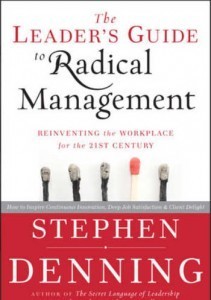The Future of Management Has Already Arrived – Part IV: Radical Management
by Rod Collins
 Stephen Denning’s highly acclaimed book, The Leader’s Guide to Radical Management: Reinventing the Workplace for the 21st Century, is a primer for business leaders who are ready to embrace a radically different way of managing. With return on assets for U. S. firms at a mere quarter of 1965 levels, only one in five workers fully engaged at work, and customers virally ravaging brands on You Tube when bureaucratic minions turn deaf ears to their reasonable complaints, it’s very clear that the traditional management model is not designed for the unprecedented challenges facing business leaders in these first decades of the twenty-first century. We suddenly find ourselves in a new world with new rules. Radical Management is a management alternative that enables business leaders to master the new rules of twenty-first century business.
Stephen Denning’s highly acclaimed book, The Leader’s Guide to Radical Management: Reinventing the Workplace for the 21st Century, is a primer for business leaders who are ready to embrace a radically different way of managing. With return on assets for U. S. firms at a mere quarter of 1965 levels, only one in five workers fully engaged at work, and customers virally ravaging brands on You Tube when bureaucratic minions turn deaf ears to their reasonable complaints, it’s very clear that the traditional management model is not designed for the unprecedented challenges facing business leaders in these first decades of the twenty-first century. We suddenly find ourselves in a new world with new rules. Radical Management is a management alternative that enables business leaders to master the new rules of twenty-first century business.
Radical Management is a completely different way of thinking and acting about management that starts by getting the goal right. Denning argues that the purpose of a business is not about creating shareholder wealth; it’s about delighting customers. Citing numerous examples from an emerging group of innovative companies, such as Salesforce.com, Total Attorneys, Systematic Software, and Thogus Products, Denning describes how their leaders apply this radical notion to achieve extraordinary results and provides compelling evidence that the pathway to product excellence and its corresponding profits is to remain riveted on what’s most important to customers.
Shifting the managerial focus from shareholder wealth to customer delight calls for a complete overhaul of management principles and practices. Denning’s model is based upon five fundamental principles that serve as the foundation for the twenty-first century organization:
1. Organizational Goal: A shift from an inward-looking goal of making money and maximizing shareholder value to an outward goal of delighting customers profitably. Innovation and transformation are no longer options: they are now imperatives. In today’s hyper-connected world, the companies that are most likely to endure are those who know how to continually delight their customers and turn them into active promoters of the company’s goods and services.
2. Organizational Structure: A shift from managers controlling individuals to enabling collaboration among diverse self-organizing teams, networks, and ecosystems. Self-organizing structures are better suited for the exploratory and iterative effort needed to solve today’s increasingly complex problems. Without someone in charge, self-organizing teams are more likely to venture into the unknown and make the unusual connections that are the crucibles for discovering new ways to exceed customer expectations.
3. Coordination of Work: A shift from coordinating work by hierarchical bureaucracy with rules, roles, plans and reports to dynamic linking, with iterative approaches to development along with direct customer feedback from, and interaction with, teams, networks, and ecosystems. In dynamic markets, efficiency has less to do with reducing costs and more to do with delivering value to clients more quickly. That’s why the practitioners of Radical Management don’t rely on abstract status reports to gauge their progress; instead, they produce finished work in short iterations so that actual customers or their proxies can touch and feel the developing product. If the work is missing the mark, the work team finds out sooner than later; if they are delighting the clients, they can quickly proceed with a greater sense of certainty.
4. Values: A shift from a single-minded preoccupation with economic value and efficiency to an embrace of values that will grow the firm and the accompanying ecosystems, particularly radical transparency, continuous improvement, and sustainability. When work is iteratively performed by self-organizing teams in a context of relentless transparency, workers get to the root causes of problems more quickly and the company learns and improves far faster than happens in hierarchical organizations where, far too often, making managers look good takes precedence over getting it right for the customers. In the transparent work environment, work teams enjoy what they are doing, want to get better, and collectively find ways to become more productive.
5. Communications: A shift from top-down directives to multi-directional conversations. Instead of telling people what to do, leaders inspire people across organizational boundaries to work together on common goals. Leaders in Radical Management organizations are catalysts and facilitators who enable interactive conversations, active listening, and deep inquiry. Rather than advocating a point of view, they pose open-ended questions and encourage open communications to enhance learning and to help the team find its own path.
The five principles of Radical Management are not a futuristic theory about what a workplace could be. They are the components of a management system currently used by some of today’s best-run companies to achieve extraordinary results in fast-changing markets. Radical Management is accomplishing the task of reinventing the workplace and is tangible proof that the future of management has already arrived.
Rod Collins (@collinsrod) is Director of Innovation at Optimity Advisors and author of Wiki Management: A Revolutionary New Model for a Rapidly Changing and Collaborative World (AMACOM Books, 2014).
Rod Collins's Blog
- Rod Collins's profile
- 2 followers



